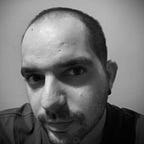The Paradox of Consciousness: Finding Meaning in a Crowded World
I haven’t written anything for a while, but I just turned 36 and the balance between finding a meaning and being honest and true to the “self”, has just stopped being the struggle it always was.
A very important part of growing up is the importance of measuring, learning and accepting the limitations of one’s brain and body. These limitations serve a very important purpose and that is to allow intelligence and consciousness to actually exist.
Intelligence allows you to create models of your environment, while consciousness (as the product of that modelling) is forced by its own limitations to choose the model of the environment that it can call the “self”. That exact self is attached to the evolutionary agency that loves goals and costs. Goals and costs allow probabilistic choices and probabilistic choices allow for the survival of not just the fittest, but also the smartest.
We end up having more elaborate goals and costs, because this is how evolution works. Then the “bubble” of our goals and costs suddenly is starting to include other agents that seem to do things not entirely based on their environment, but based on something that is taking place in them, in their mind. Thought is becoming the main condition for the actions of these creatures, and those thoughts are close to ours. We can understand their actions, not just based on their environment but based on our own goals and costs.
Then all hell broke loose.
Suddenly we are in groups, we are starting to share reasons, emotions, goals. We are starting to see others as ourselves and ourselves as others. Empathy is becoming a thing and it rules everything. Ephemeral ethical standards are coming and going based on how big the groups are and how mature the empathetic inferences are getting.
But then the most counter intuitive trend is starting to show…. the more people we connect with, the sadder we can become. And that is because our capacity of empathy, of computation…. is now full. We have become too many. We are increasingly becoming aware of others’ issues and problems, but we are also becoming increasingly incapable to solve them all.
So we compartmentalise.
People are becoming really good at very specific issues and whole systems are starting to be built. This compartmentalisation allowed for technology to emerge. And this point, allowed for even bigger groups, even bigger economies, that changed a fundamental aspect of agency by introducing a serious imbalance between agency and consciousness.
Agency remained for the individual agent (and parts of consciousness too), but the major consciousness part is now for the many, for the species. In other words, the empathy the we once felt for our fellow human is now completely replaced with the empathy for the human species. The consciousness you once had is now irrelevant, because it is not about you anymore. The whole change that is happening all around you, even the work that you are doing, is not about you. It is about the whole species.
So now, suddenly humans have two main conscious experiences: the self and the species. Both “selves” are major forces of individual happiness and goal/cost calculation. But, now humans need to figure out how to allocate their already limited capacities.
Which part should I do for me and which part should I do for the species? What will make me more happy?
And the answer cannot be more simple. Solve, whatever your limitations allow you to solve, while listening to both your individual self and the species. Accept the parts that are chemical and the parts that are algorithmic (arguably also chemical) and accept what you should be optimising for.
In other words… grow up and accept yourself and what work needs to be done in order for you to have the place you need to have in your species. You are part of two conscious experiences that need the right type of work and energy, in order for you to feel fulfilled.
It is always about energy allocation. About learning what work you have to do… and just do it. Grow up and do the work.
You see… the thing with happiness and sadness is that it is an exact analogy of light and darkness. Darkness is the absence of light, as sadness is the absence of happiness. But most importantly, light needs energy it needs work, while darkness is the absence of that energy, of that work. That is why happiness is harder than sadness… because to be happy you need to work for it, but to be sad all you need to do is sit and do nothing and as soon as the energy leaves your body, the light goes away and you are sad.. again.
I call this whole journey the paradox of evolutionary consciousness.
In the end, the paradox of consciousness is not something to be solved but something to be lived. The dance between the self and the species, between individual happiness and collective well-being, is the very essence of our existence. We are both the light that illuminates our own path and the darkness that binds us to the struggles of others.
So, perhaps the answer lies not in choosing one over the other but in embracing both, recognizing that the work we do for ourselves and the work we do for the species are not opposing forces, but rather two sides of the same coin.
To grow up is to accept this paradox, to find peace in the tension, and to understand that true fulfillment comes not from escaping the struggle, but from engaging with it fully. It is in this engagement that we find meaning, in a world crowded with thoughts, goals, and selves, we carve out our place, not just as individuals, but as conscious participants in the grand, ongoing story of humanity.
Let the limitations guide your light.
